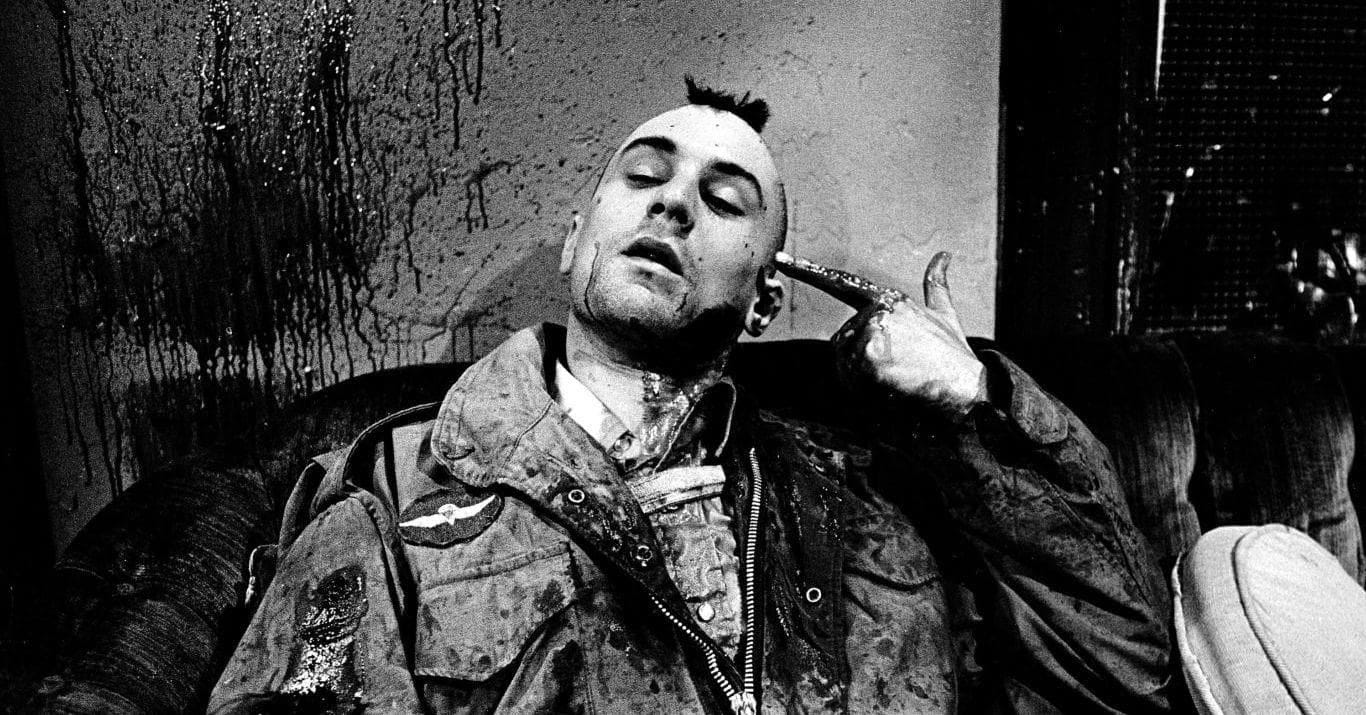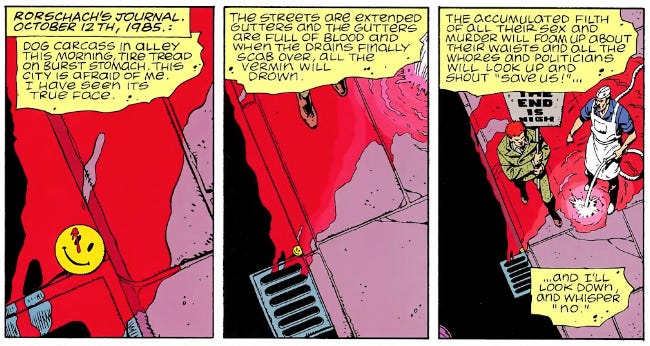Travis Bickle and Rorschach Walk Into a Bar
A ponerology glossary entry on schizoid personality disorder
This series reproduces and expands on the glossary entries included in Political Ponerology.
schizoidal psychopathy: Originally used to describe the personality of premorbid schizophrenics, schizoidia shares some common symptoms with autism and was the basis for the later “Cluster A” personality disorders: schizoid, schizotypal, and paranoid. The ICD-11 defines the detachment personality disorder trait domain as a tendency to social detachment (avoidance of social interactions, intimacy, and lack of friendships) and emotional detachment (being reserved, aloofness, limited emotional expression and experience). It is the only personality disorder aside from psychopathy that features low negative affectivity (absence of emotional intensity and sensitivity). Some research suggests the existence of two distinct groups falling under schizoidal personality disorder: “an ‘affect constricted’ group, who might better be subsumed within schizotypal personality disorder, and a ‘seclusive’ group, who might better be subsumed within avoidant personality disorder [see asthenic psychopathy].”
I’ve written about schizoids several times (see here and here, for example). Unless you’re a King Crimson fan, you might not have even heard the word before. I hadn’t when I first read Ponerology.
Here are their main traits, based on Lobaczewski and the DSM:
Emotional coldness, detachment, or flattened affectivity
Neither desires nor enjoys close relationships, including being part of a family; lacks close friends or confidants other than first-degree relatives; has little, if any, interest in having sexual experiences with another person (Lobaczewski doesn’t include this last one, ascribing it to asthenic psychopathy instead)
Almost always chooses solitary activities; takes pleasure in few, if any, activities
Can excel in rational, abstract reasoning, and related fields (e.g. economics, STEM fields), leading to a sense of intellectual superiority to “emotional” normies
Tend to see human reality in a doctrinaire, simplistic, “legalistic” manner, and to assume extreme, moralizing positions; cynical about human nature
According to the DSM they appear indifferent to the praise or criticism of others; somewhat contradictorily, Lobaczewski says that they are hypersensitive and distrustful, misjudge others’ intentions in a pejorative way, and are eager to retaliate for minor offenses (paranoid traits)
Failure to understand social interactions (autistic spectrum traits)
Sometime eccentric and odd (schizotypal traits)
Fiction can be a great way to capture the “flavor” of personality disorders. Such portrayals are rarely perfect, but sometimes they get pretty damn close. For instance, Hervey Cleckley recommended Mary Astor’s novel The Incredible Charlie Carewe as a perfect fictional representation of the psychopathic personality.
When it comes to schizoid personality, the example that gets mentioned the most online seems to be Antony Hopkins’s character “Stevens” in The Remains of the Day (based on the novel by Kazuo Ishiguro).
I was joking with some of the Deimos Station guys a while ago that Alan Morrison’s Watchmen is like the DSM of comic books. Turns out I’m not the only one to think so! There are two “Cluster A” characters: Dr. Manhattan and Rorschach.
Dr. Manhattan is an emotionally detached loner who can’t relate to people and gets lost in his mental world of abstraction. Very schizoid. But the comparison only goes so far, since these features are the result of his accidentally acquired powers and transformation into something barely human. The godlike scope of his vision of space and time causes him to lose touch with human realities to the point that “the morality of my activities escapes me,” as he puts it in the comic. But then he has moments like this (follow the link in the caption to read his explanation, which is charmingly autistic):
The links above diagnose Rorschach with paranoid personality disorder. That fits. But to me he screams trauma-based paranoia overlaid on an underlying schizoid personality. Lobaczewski considered schizoidia an inborn personality type, paranoia a trauma-based deformation of character, and Rorschach’s abusive childhood reflects that.
He, too, is a loner—a cynical, misanthropic vigilante who sees nothing but filth and immorality in humanity. The one person he admires (The Comedian) is a violent sociopath. Rorschach is disgusted by sex, others find him weird and unhinged, and he sees the world in strictly black and white, like the colors of his mask—a self-morphing Rorschach blot. He’s a moral absolutist out to rid the world of scum and villainy. He’s also deeply disturbed. He’s not a hero.
I always got Travis Bickle vibes from Rorschach. “Someday a real rain will come and wash the scum off these streets.”
Bickle is Robert de Niro’s character in Taxi Driver. He also has schizoid traits: dull affect (positive and negative), loner, socially inept, strong moralizing interpretation. According to this paper, he matches all the criteria for schizotypal personality disorder. For those of you who know the film’s ending, this Lobaczewski quote should ring true: “They easily become involved in activities which are ostensibly moral, but which actually inflict damage upon themselves and others.” In other words, good intentions… And when things don’t go the way they expected, they tend to project blame, confirming their low opinion of humanity.
This video essay on Bickle is also great. Here’s how it ends:
Travis Bickle saw the world and all its flaws on full display, but he never managed to find the flaws in his own character, believing himself to be the one sane man in a world of insanity, and he thoroughly believed that what he was doing was selfless, a man standing up when others wouldn’t, when in reality he was only trying to live out his own desire to make a change and find purpose in his life, solving the world’s problems, real or perceived, to satisfy himself no matter how much he thought otherwise.
Misanthropic, misguided, and self-maligned, the case of Travis Bickle is an unfortunate example of the detriments of unchecked mental health, a man who was rife with issues both personal and emotional that roiled in his mind until they coalesced into projecting these issues onto nearly everyone around him, and though he may have intended to do good, a man like Travis is as Betsy said, a walking contradiction, a ticking time bomb of angst and anger just waiting to be unleashed upon the people he believes deserves it, and though we can feel sorry for the tragedy that is his inability to understand his own effect on the misery in his life and hope to see people like Travis get the help that they deserve, his beliefs and the actions he takes and will inevitably take if left to his own devices are clouded by evil.
One last pop culture example: From what I remember about Dexter, he starts out as a great representation of a psychopathic serial killer (particularly in the first episode), but as the series progresses, comes more to resemble a schizoid.
Now, searching around YouTube I found a handful of videos of real people with diagnosed SPD. This video shows the lack of affect, and extreme interpersonal detachment:
This guy expresses the inner emptiness, lack of feeling for family or girlfriends, among other things (the color scheme is a deliberate representation of his inner landscape):
“Schizoid Angst” has an interesting channel devoted to ’zoid issues:
In this interview, he makes an interesting point:
I don’t think I was born with that stuff [i.e. disgust with intimacy, lack of positive affect]. I think that stuff developed via being born with a kind of different way of experiencing life, like, just having a different emphasis or focus on what it is that I value in my environment in comparison to the average child that was around me. And when those behaviors aren’t congruent with what society expects of you, then you’re gonna get a combination of both rejection from your peers as well as rejection from your authority figures.
So I would say those parts, like, the way my brain works and gravitates toward what I often call abstract things, I would say that part I was born with, but the other stuff was definitely an environmental factor. Like, I thought I would have been a lot less misanthropic or whatever, had I been accepted early on as a, you know, different sort of kid, and that that’s okay, to be a different sort of kid that has a different sort of expression and a different sort of emphasis on what they care about. That doesn’t make me a psycho, it doesn’t make me just weird or bad or you know shameful.
Lobaczewski makes a similar point about “normal society’s” rejection of such persons, and its effect on their subsequent way of looking at society. He also says this:
Although highly active in the early phases of [ponerogenesis], they betray an attraction to pathocracy as well as the rational distance of efficient thinking. Thus they are torn between such a system and the society of normal people. (PP, p. 231)
In other words, schizoidal rationality can put them on the side of the normies against the pathocrats, especially in later stages of pathocracy. But in the meantime, it will be a battle of dual loyalties, feeling torn between the two worlds. Like Bickle, they may long for a connection they feel powerless to achieve, and which may be impossible.





Sad.
I was like the opposite, as a kid. I felt so intensely it could be debilitating. I was intensely shy, because i had no boundaries between my emotions and the emotions of others, I could feel their emotion as intensely as my own. That was an issue for me well into my twenties, and it was only until my mid thirties when I learned some tools about how to maintain emotional boundaries. I'm much more at ease now than I used to be, but relationships where boundaries have to be opened up can be difficult.
I was thinking about Watchmen just the other day... been wondering if the faked alien plot is the next psy op they are going to pull... seems they were playing with it with the balloons....